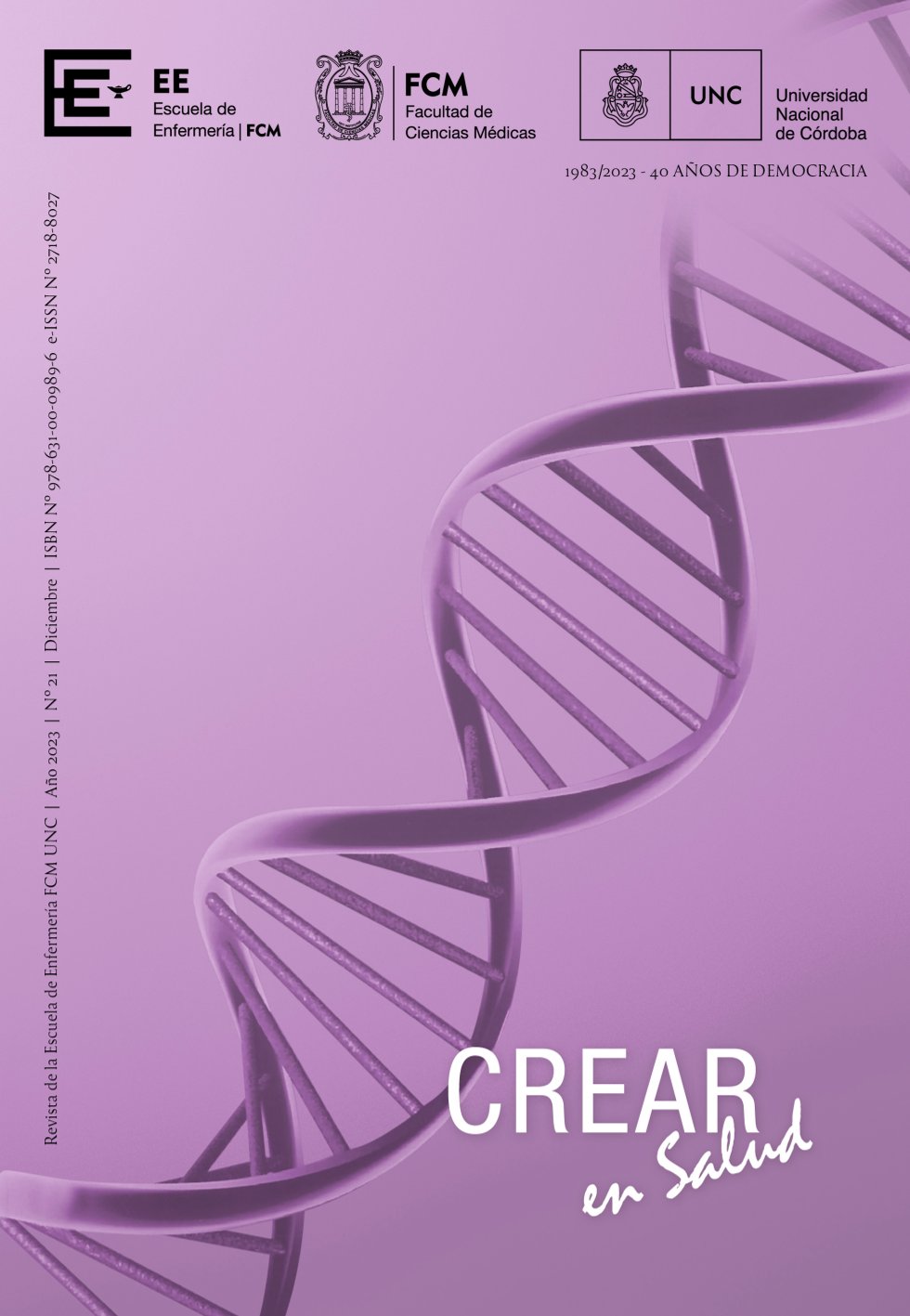Strategies implemented for health care in nursing homes
Keywords:
COVID-19, elderly, pandemic, nursingAbstract
Introduction: The COVID-9 pandemic had an impact worldwide, with the elderly being the vulnerable age group. Protocol confinement measures imposed by the Government of the Argentine Nation, 2020, were applied to prevent infections and preserve health, this generated an impact on the mental health of geriatric residents. Objective: Analyze the nursing strategies
implemented for health care in nursing homes in the years 2020-2022. Methodology: Crosssectional descriptive
quantitative study. Population, nursing staff, graduates, professionals and assistants who worked in the geriatric residence in the years 2020-2022. What determined findings, from the dimensions “Of oneself”; “Of the others”; “From the context.” A
contextualized interview schedule was applied in the three stages, pre-pandemic, pandemic and post-pandemic. Results and discussion: The findings of dimension 1. Of the self, activityexercise, at the pre-pandemic moment 85%; in pandemic 30% and in post-pandemic 65%, the rest of the results were not influenced, remaining at 100% at all intermediate, immediate and long-term moments. Dimension 2. In the others, in the pre-pandemic stage the family had 90%, in the pandemic 5% and post pandemic 65%. Among peers 60% pre-pandemic, 60% in pandemic and 80% post-pandemic. While the bond with the nurse was always maintained 100%. Dimension 3. In the context, PPE methods and pre-pandemic COVID-19 protocols 0%; in a pandemic 100% and in the post-pandemic stage care is maintained at 100%. Conclusion: Analyzing the three dimensions proposed as the conceptual axis of the Tide theory by (Barker 2015), we agree with the author given that the model allows us to advance in the stages of care, generating a therapeutic bond. Inviting nurses to begin to meaningfully understand mental health. The objectives of the implementation of strategies for the health care of the elderly in nursing homes were met.
References
Barker, P., & Buchanan-Barker, P. (2015). El Modelo Tidal. Salud mental, reivindicación y recuperación. Servicio Andaluz de Salud. https://www.1decada4.es/pluginfile.php/760/mod_label/intro/TidalManualespaniol.pdf
Declaración de Helsinki de la Asociación Médica Mundial. (2017). Principios éticos para las investigaciones médicas en seres humanos. https://wwwwma.net/es/policies-post/declaracion-de-helsinki-de-la-amm-principios-eticos- para-las-investigaciones-medicas-en-seres-humanos/
Fusté Bruzain, M. Pérez Inerárity, M. y Paz Enrique, L. E. (2018). Caracterizaciónde las redes de apoyo social del adulto mayor en la Casa de Abuelos del municipio de Camajuaní. Revista novedades en población, 14 (27). http://scielo.sld.cu/scielo.phpscript=sci_arttext&pid=S181740782018000100012
Guerrero, N. Yépez, M. (2015). Factores asociados a la vulnerabilidad del adultomayor con alteraciones de salud. Revista Universidad y Salud, 17 (1), 121131. https://revistas.udenar.edu.co/index.php/usalud/article/view/2402
Hernández, N., Sánchez, M. y Pacheco, J. (2018). Las Estrategias como herramienta en el desarrollo científico de enfermería. Revista Archivo Medico de Camagüey, 22(4), 564- 580. http://scielo.sld.cu/scielo. phpscript=sci_arttext&pid=S102502552018000400564&lng=es&nrm=iso#B15
Ministerio de la Nación Argentina. (2020) Legislación y avisos oficiales. El gobierno Nacional decretó aislamiento social preventivo y obligatorio. https://www.argentina.gob.ar/noticias/el-gobierno-nacional-decreto-el-aislamiento-social-preventivo-y-obligatorio
Organización Panamericana de la Salud. Organización de la Salud (2020). La COVID-19 y Adultos Mayores. https://www.paho.org/es/envejecimiento-saludable/covid-19-adultos-mayores
Organización Mundial de la Salud. (2021). Envejecimiento y salud. https://www.who.int/es/news-room/fact-sheets/detail/ageing-and-health
Organización de las Naciones Unidas (2020). Respuesta a la COVID-19. https://www.un.org/es/coronavirus Organización Panamericana de la Salud. Organización Mundial de la Salud. (2020) La OMS caracteriza la COVID-19 como una pandemia. https://www.paho.org/es/noticias/11-3-2020-oms-caracteriza-covid19-como-pandemia
Ramírez Ortiz, J. Castro Quintero, D. Lerma Córdoba, C. Yela Ceballos, F. Escobar Córdoba, F. (2020). Consecuencias de la pandemia covid 19 en la salud mental asociadas al aislamiento social. Revista colombiana de Anestesiología, 48 (4). https://www.researchgate.net/publication/344157547_Consecuencias_de_la_pandemia_de_la_COVID-19_en_la_salud_mental_asociadas_al_aislamiento_social
Tabloski P. (2010). Enfermería Gerontológica. 2da Edición. Pearson Educación, S.A. España. http://docshare01.docshare.tips/files/26020/260202689.pdf
Downloads
Published
Issue
Section
License
Copyright (c) 2023 Crear en Salud

This work is licensed under a Creative Commons Attribution-NonCommercial 4.0 International License.



